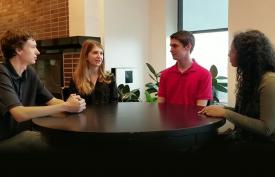Otherworldly internships: Rutgers seniors talk time at NASA
Three seniors in the School of Engineering had the opportunity to intern at NASA centers around the country, working on projects ranging from lunar-orbit space stations to supersonic airplanes and 3D printing new materials.
Kaitlyn Welch, who is majoring in aerospace engineering, interned last summer at the Langley Research Center in Hampton, Va. Welch was accepted to a position as a Gateway utilization analyst, which meant she would do data analysis for how NASA would design the Lunar Orbital Platform-Gateway, a proposed space station that would orbit around the moon.
Otherwise known as the Gateway, NASA intends to use it as a science laboratory, communications hub and holding area for rovers and robots. During her internship, Welch analyzed the different power, volume and mass requirements of the space station so NASA can account for the data when designing the Gateway.
She said the best part of her internship was being able to see the different projects everyone was working on. Welch saw mock-ups of future inflatable habitats on Mars.
Since the Langley Research Center is the first aeronautical research laboratory, Welch said there was also a lot of history there.
“It was where the astronauts practiced for the first moon walk,” she said.
Interning at NASA is a step toward Welch’s dream career, which she said is to work on a more hands-on project that focuses on deep space exploration such as the Orion spacecraft.
“Optimally, I would like to work on a satellite going to the moon or Mars,” she said.
Michael Nitzsche, who is majoring in mechanical engineering and computer science, said he interned for NASA at the Glenn Research Center in Cleveland, Ohio.
During middle school, Nitzsche said that he joined a robotics team that did programming and research for an innovative solution to climate-based problems, and that it inspired him to become an engineer.
He worked on a project improving the energy efficiency and stability of supersonic airplanes by installing small holes in the inlets to remove unwanted, low energy air.
Nitzsche said he also worked on computer simulations that are helping supersonic planes fly over land — commercial supersonic planes are unable to fly over land otherwise the windows of houses below would shatter.
NASA is currently designing models for a quieter airplane, which include the design for the nose cone Nitzsche worked on, he said. Ideally, his models will direct shockwaves above the plane, preventing windows from shattering.
Also majoring in mechanical engineering, Robert Randolph was inspired to work with aviation and space flight when he received his pilot’s license and started flying planes recreationally during high school.
As a sophomore at Rutgers, he conducted research with Dr. Aaron Mazzeo, an assistant professor in the Department of Mechanical and Aerospace Engineering, which was funded by a grant from NASA.
Randolph then had the opportunity to intern with NASA for two consecutive summers.
During his first summer, he worked on 3D printing materials such as adhesives, a step away from traditional plastic and metal 3D printing, and then modeled how these materials molded under different gravity and heat conditions.
“Each material has different advantages and disadvantages to application,” he said.
The next summer of his internship, Randolph worked on 3D printing capacitive sensors, which can detect anything conductive such as a person’s hand, he said.
For Randolph, the most memorable part of his internship was presenting his research in front of Mark Cuban, an investor on "Shark Tank," as well as other judges at a tech-inspired version of the show.
“It was a nerve-wracking and unusual way to get grant money, but it was interesting,” he said.
All three seniors shared advice to anyone hoping to intern or work for NASA.
As a female in a male-dominated field, Welch advises girls never count themselves out of an opportunity, even if they think they are not qualified.
“Most positions I’ve been hired for had other qualifications I didn’t have, but I told them that I was willing to learn. Enthusiasm goes a long way,” she said.
Nitzsche’s advice for NASA-hopefuls is to get involved in research and organizations on campus.
“Being able to demonstrate that you have good skills and are a good communicator will translate very well into a resume you can sell yourself with,” he said.
Randolph emphasized applying to as many internships as possible.
“Don’t be afraid to keep applying,” he said.
Video Interview by HC Media Team Leader Simran Fernandes ('19, RBS/HC/DRC)
FULL SOURCE: The Daily Targum | Otherworldly internships: Rutgers seniors talk time at NASA
